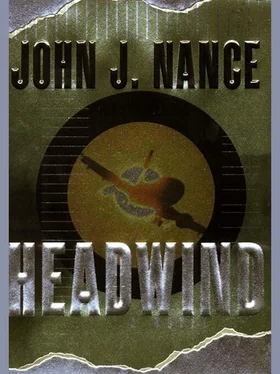There was high terrain ahead, he knew. The minimum safe altitude through this area was eleven thousand three hundred feet, and they were just climbing through ten thousand five hundred very slowly. The engine was at maximum power, and the cumulo-granite ahead – as pilots sometimes called mountains – reached ten thousand feet.
Once again he called for Denver Center, hearing nothing but static in return.
“I don’t understand this. It was working on the ground,” he said in frustration, immediately sorry he’d spoken his concern.
“We, ah… have a problem?” Jay Reinhart asked, his voice tense.
“No… not really. I just… it would be better if we could talk to them.”
There was a small electronic chirping suddenly in the cockpit, heard over both headsets. The warning noise was totally unfamiliar, and David began looking for the source of the warning, checking his airspeed and instruments.
That’s… what IS that? That’s not a stall warning? Engine’s okay. What the hell?
He noticed movement to his right and looked around to see his passenger pull a small cell phone from his pocket and point to it before placing it to his ear.
David brought his eyes back to the ADI and felt his heart leap. The artificial horizon line was nearly vertical when it should have been horizontal.
“ Jeez !” He rolled the control yoke to the left, instantly realizing he’d gone the wrong way. They had rolled almost ninety degrees left and the nose was dropping, the altitude beginning to unwind as he rotated the yoke to the right and righted the horizon, bringing the nose back to level flight.
Ten thousand one hundred! Climb! Dammit, dammit, dammit! Control yourself!
He’d lost five hundred feet to a momentary spatial disorientation, but Professor Reinhart had been busy talking on his phone and hadn’t seemed to notice.
Thank God, David thought. The professor was nervous enough as it was.
Lord! Do NOT do that again! David told himself. Eyes remain on the ADI. Don’t forget that’s exactly what killed JFK Junior!
David checked the mileage from Laramie on one of the instruments. They were twenty-two nautical miles from the field and approaching the mountain ridge crossed by U.S. 287. He checked the altitude again. Ten thousand three hundred, climbing very slowly. His heart was pounding but he kept a poker face as he scanned the instruments and began wondering whether they should turn back.
No, I can’t turn back on instruments. I’m cleared to Denver. If I can’t talk to the controllers, there’s no way I can get cleared for an approach back to Laramie. I’d better go on. Besides, Denver International has a lot more facilities than Laramie.
Having to peel his hand away from the edge of his seat to grab the cell phone had been a small agony for Jay Reinhart, but the moment Sherry’s voice came on the line, his entire concentration shifted to what she was saying.
“Yes, Sherry. I’m… in flight… heading for Denver. It’s pretty rough. What’s happening there?”
She quickly brought him up to date on the approval of the charter, Campbell’s visit, and her suspicions that he was regrouping for another try.
“Shouldn’t we get out of here now?” she asked. “The captain says he can leave at any time.”
“Not yet, Sherry. I don’t know where to send you.”
“I thought you said Britain.”
“I did, and that’s probably right, but I’ve got some research to do, and I can’t do it in this small plane. Is there any reason to think the Italians are changing their minds about not invading that ramp?”
There was a burst of static on the line and a muffled voice where Sherry had been.
“Sherry? Hello?”
More static, then a click, and a series of squeaks and squawks before the line went dead.
“Damn cell phones.”
David’s eyes remained welded to the forward panel, but Jay could see him nod. “They’re not supposed to be used in the air, and we’re probably in a marginal area anyway.”
“Still no contact with Denver?” Jay asked.
David shook his head, gesturing to the panel. “I tried switching to my second radio, but I totally forgot it’s been intermittent. I meant to have a radio shop look at it last month. But they know we’re here. See that little blinking light on the transponder?”
“The what?”
David pointed to it. “That little panel. When the air traffic control radar beams sweep past us, they trigger that little transmitter, and it sends the controller our altitude and position. The blinking light means they’re tracking us, even though I can’t talk to them.”
“That’s a relief,” Jay said. “I think.”
David checked the mileage from the Laramie VOR, the radio navigation beacon he was using to navigate down the center of the invisible air lane called V-575.
Forty-three miles. We’re past the highest terrain.
He felt himself relax slightly for the first time.
The White House
The Chief of Staff was back in his favorite perch on the forward edge of his desk while his secretary and three other staff members stood, leaned, or sat in various positions in the cramped office.
“So they know already?” Jack Rollins asked.
Richard Hailey, the Deputy Communications Director, glanced at Press Secretary Diane Beecher before replying. She diverted her eyes, leaving Hailey to speak.
“The Italian Foreign Ministry was informed about ten minutes ago by Peru’s lawyer that President Harris was still aboard.”
“That’s Stuart Campbell who did the informing, you can be sure,” another staff member added, checking the name on a notebook.
“Right,” Hailey agreed. “And we expect he’ll be informing the media almost immediately to try to portray Harris, and us, as purposefully deceptive.”
“So,” Rollins said, “Diane? We’d better talk to them.”
She nodded. “I’ve got a tentative briefing scheduled in fifteen minutes.”
He nodded. “Same script we all agreed on?”
“Yes,” she confirmed. “We’re really concerned that some members of the media may have misunderstood our previous briefing that the reception at Andrews was for President Harris, when in fact we’re simply saying thank you to the flight crew for their rapid response. The President was not on board because President Cavanaugh determined that it would be inappropriate, yada, yada, yada.”
“Will it wash?” Rollins asked, already shaking his head.
“That’s a rhetorical question, right?” Beecher replied. “At least it’ll be on the record.”
National Security Advisor Michael Goldboro had come in quietly.
“Jack,” he said, getting Rollins’s nodded acknowledgment. “Campbell apparently had a plan B on the shelf. His people have snagged an Italian justice from the Court of Cassation, their equivalent of a supreme court for criminal matters. The judge is at home, and they’re trying to convince him to issue an order which would essentially require the police to forcibly enter the flight-line ramp at Sigonella and arrest Harris.”
“How?” Rollins asked. “I mean, that affects a treaty right.”
Goldboro shook his head. “The Foreign Ministry’s been fudging that interpretation for us. They know, and the judges know, that the lease on that base – more accurately called the Status of Forces Agreement – does not preclude Italian jurisdiction. The flight-line thing is a red herring. If that order is issued, the police, or the army in Sicily, can blow past the Navy guards in an instant, and we can’t, and shouldn’t, try to stop them.”
“In other words, the judiciary may take over the issue.”
“That’s right. The second an order is issued, the Foreign Ministry is out of it.”
Читать дальше












